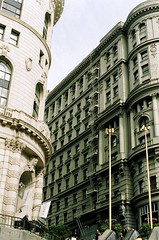UC and Google Books
August 2nd, 2006 by Hugh
The Exbiblio system is, of course, about closely integrating print on paper with online texts. One of the obstacles that needs to be overcome is the fact that the majority of written texts do not yet exist in digital form. The Google Books Project aims to change that, but it faces quite a struggle against copyright holders, many of whom hate the idea of their property being propagated over the internet. Personally, I think they are wrong. The existence of digital texts does not discourage me from buying a nice paper copy of classical books such as War and Peace, but that’s by the by.
The LA Times reports that The University of California is in talks with Google to digitize 34 million volumes from its 100 libraries on 10 campuses. It’s said to be the largest academic library in the world:
Daniel Greenstein, UC’s associate vice provost for scholarly information, said that joining the Google Books Library Project — with its ability to search for terms inside texts, not only in catalog listings — would help “create access like we’ve never had before to our cultural heritage and scholarly memory. It’s a whole new paradigm.”
Greenstein mentioned the fear that a natural disaster might destroy this body of knowledge for ever. He was no doubt thinking of the fire at the Library of Alexandria where many of the great texts of the ancient world were lost, possibly during the war between Egypt’s royal family and Julius Caesar in AD 48. Incidentally, Stanford University has just recovered some lost works from the Greek scientist Archimedes who in the 3rd Century BC jumped out of his bath an shouted “Eureka!” – “I have found”.
More about the UC talks with Google can be found on Tim O’Reilly’s blog.

 Last Sunday, the people of war-torn Congo queued up at the
Last Sunday, the people of war-torn Congo queued up at the 

